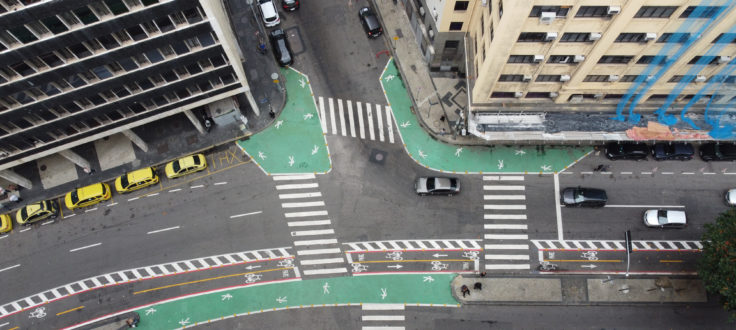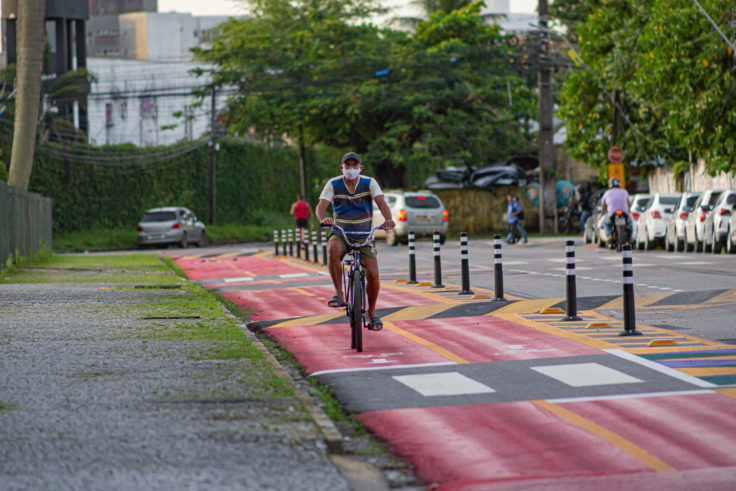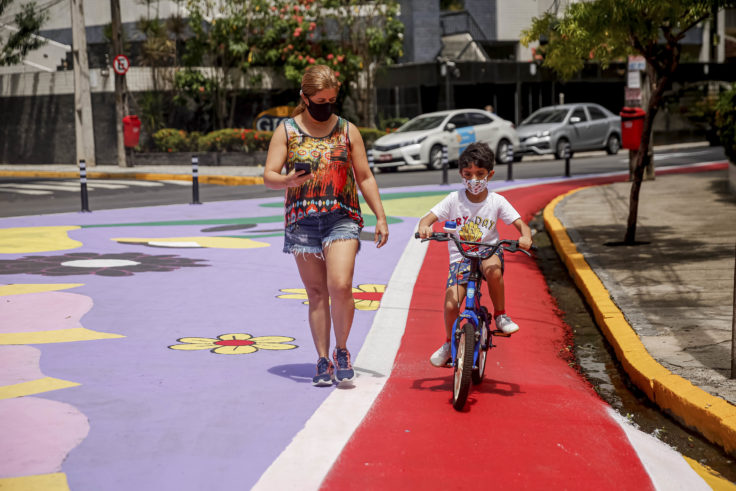February 06, 2023
Building Cycling Cities in Rio de Janeiro and Recife, Brazil
Brazil’s cities have long faced unequal patterns of urban development that have made mobility and access a major challenge for many communities. As the COVID-19 crisis underscored long-standing inequities and a lack of sustainability in the nation’s transport systems, it also demonstrated the immense potential of one transport mode in particular: cycling.
ITDP has long recognized the social, environmental, and economic benefits of cycling and — with its global resurgence during the pandemic — launched the Cycling Cities campaign in 2021 to bring millions more people closer to safe, accessible cycling infrastructure as part of the future of urban transport. In Brazil, ITDP has been active across the country since 2009, working to promote sustainable mobility projects that improve transport systems and urban life for all Brazilians. The promotion of cycling in particular has been a core pillar of these efforts. Over the past decade, ITDP Brazil has been working closely with major cities to advance a vision for urban cycling that is inclusive and comprehensive, particularly in the major regions of Rio de Janeiro and Recife.

In the city of Rio, ITDP Brazil has been partnering with public officials and civil society actors for more than a decade to strengthen policies that promote cycling and active mobility. Beginning in 2009, ITDP Brazil began collaborating with Rio’s City Hall to produce a report with recommendations for the integration of active transport modes, like cycling and walking, with the city’s TransCarioca Bus Rapid Transit (BRT) corridor that would allow for more efficient multi-modal commutes. In large cities, such integrated and well-connected rapid transit systems are crucial for shifting people away from driving towards alternative transport modes.
In 2012, in the lead up to the landmark Rio+20 Conference on sustainable development, ITDP Brazil and its partners presented a proposal to the city of Rio for creating cycling connections between key neighborhoods that hosted events related to the Conference, which ultimately drew over 45,000 attendees. This proposal propelled the Ciclo Rotas Centro project in 2012, which brought together civil society organizations, cyclists, academics, and advocates to consolidate a plan for adding 33 kilometers of safe cycling routes throughout the city center.

Around the same time, Rio became a regional pioneer in the implementation of the city’s first bikeshare system, known as BikeRio, which was inaugurated in 2011. Since BikeRio’s launch, ITDP Brazil has continued to collaborate with its operators and the city to improve the system’s operations, financing, and management, while sharing best practices with other local governments interested in bikeshare. Building on this momentum for cycling, a public- and private-sector working group (which included ITDP Brazil) was formed in 2014 by the city of Rio to provide the first city-wide specifications for cycling infrastructure that outlined technical criteria for street typology, design, signage, paving, wayfinding, and beyond. ITDP Brazil subsequently organized BiciRio events between 2014 and 2017, bringing together international experts, academics, activists, public officials and more to share best practices related to cycling policy.
ITDP Brazil was also instrumental in organizing the first manual bicycle counts in the country alongside Associação Transporte Ativo (the Active Transport Association) by employing photographic counts of cyclists, a technique that is now used throughout the country for designing related policies. In 2018, ITDP Brazil helped to publish an essential guide with technical recommendations for using cyclist counts in monitoring strategies. More recently in 2021, the Ciclo Rotas Centro proposal developed by ITDP was incorporated into the plans for a Clean Mobility District (or Low Emission Zone) for downtown Rio.
Recognizing that robust, connected networks of cycling infrastructure is fundamental to promoting cycling, Rio created a Cycling Expansion Plan which was published in 2022. The Plan proposes the expansion of the city’s cycle lane network with the addition of more than 1,000 kilometers of infrastructure to the existing 425 kilometers. ITDP Brazil expects to continue working closely with local partners to construct policies that strengthen cycling across Rio, so that residents can reap the benefits of a healthier, more equitable, and more sustainable transport system.

In the northeast of Brazil, another major coastal city and cohort member of the Cycling Cities campaign has also been making major strides in urban cycling beyond Rio. Recife, the fourth largest city in the country, has taken important steps to improve the conditions for cycling locally, and ITDP Brazil has continued to support the development of sustainable mobility projects in the city since 2016. In 2017, ITDP Brazil worked with the local state government to reactivate its “Bicycle Office”, a participatory management group of the region’s Bicycle Master Plan (PDC) which is responsible for implementing comprehensive cycling infrastructure across 14 municipalities of the Recife Metropolitan Region.
The PDC was published in 2014 with a proposal to create a metropolitan cycling network and complementary support systems across all of the state’s municipalities by 2024, with over 70% of the PDC’s plan implemented as of 2021. In addition to the PDC, ITDP Brazil also supported the development of the city’s first bikeshare system, BikePE. During the height of the pandemic, the city developed emergency cycle lanes to bring cycling access closer to more communities, with the potential of making these interventions permanent.

Recife was also the first city partner of the Urban95 program, an initiative of the Bernard Van Leer Foundation launched in 2020 that seeks to promote an early childhood perspective in public policy actions across Brazil. As part of Urban95, Recife has been developing initiatives to improve the quality of its public spaces and engage more youth and families in cycling training to ensure that it is seen as an essential means of transport for all generations.
The ongoing planning and development of protected, connected, and well-maintained cycling infrastructure is critical for the future of bustling cities like Rio and Recife. It will continue to require steady collaboration and coordination with local and national governments, public agencies, private sector organizations, and communities — relationships that ITDP Brazil has been cultivating for over a decade across the country. Beyond just the physical infrastructure of lanes and facilities, supportive actions and policies that address systems-level issues will continue to be crucial for encouraging more Brazilians to view cycling as an accessible form of transport.
Learn more about the Cycling Cities campaign >>
Read more about the impacts of networks of protected cycle lanes >>
As members of ITDP’s Cycling Cities cohort, both Rio de Janeiro and Recife continue to be sustainable mobility pioneers in Brazil and are inspiring other global partners to follow in their example.
